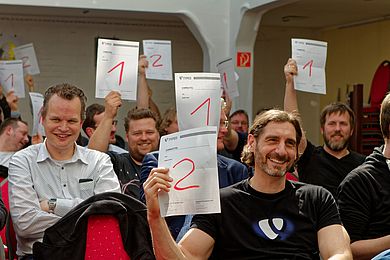The first German “TYPO3 days for universities” took place on November 21-22 at the Leibniz Universität IT Services, formally known as RRZN, the computer center of Leibniz Universität Hannover.
Many German universities use TYPO3 as content management system. The TYPO3-team of Leibniz Universität Hannover organised a TYPO3 congress especially for German universities (#t3unis), because of this popularity. The target audience for the congress were German universities using TYPO3 and it's employees who provide theTYPO3 infrastructure and manage a large amount of editors.
About 60 participants from 38 universities met in Hannover to discuss TYPO3 topics with a focus on universities. Topics ranging from corporate design in TYPO3, extensions like shibboleth, powermail or xmlinclude to case studies of TYPO3 installations at universities. Talks and introductions to Extbase/Fluid, Git, TYPO3 Flow and Caretaker were given by a wide range of speakers. Thanks a lot again to all speakers.
Besides attendants from German universities there were a number of TYPO3 Core members that enriched the congress with their presentations. Christian Müller from the TYPO3 Neos team, as keynote speaker, gave a quick overview about TYPO3 Neos. He made clear, that at this point in time the Neos team does not recommend using Neos for big projects like a university, but small side projects can de done with Neos. The development team needs feedback on Neos in production environments. In a more technical session Christian explained the TYPO3 Flow framework.
 Helmut Hummel presents TYPO3 CMS 6.0
Helmut Hummel presents TYPO3 CMS 6.0
Helmut Hummel and Steffen Gebert provided an insight on how the Core CMS Team operates and what we can expect from the latest release TYPO3 CMS 6.0. Special attention was given to the influence universities could possibly have on TYPO3 core development.
We would have liked to have more participants, but this was not possible due to limited space. The objective was to have at least one representative per university. Not all German universities using TYPO3 could be informed however and we had to reject a number of people because of the limited space available.
What were the gains of the “TYPO3 at universities” congress? Problems could be discussed and common denominators were identified. For example the need for LTS (Long Term Support) versions for universities that often have huge installations with thousands of pages and editors. How to move on now? One idea was the foundation of regional TYPO3 groups. In Baden-Württemberg the universities which use TYPO3 are already organized in a TYPO3 Admin Group for universities. More frequent regional meetings was discussed as a possibility. Future extension development could be organized within these groups, because quite a few universities have the same needs.
The possibility of having a mailing list on typo3.org was discussed. One existing mailing list for TYPO3 at universities hosted by the University of Hohenheim will be transferred to lists.typo3.org so it will be publicly accessible.





